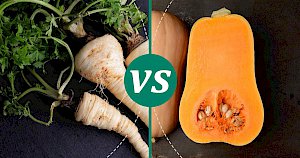Butternut Squash vs Parsnips: Nutrition, Calories & Protein Compared


Butternut squash vs Parsnips
Nutrition Facts
Serving size:
change
5g10g15g20g30g40g50g60g80g100g120g140g160g180g200g220g250g300g350g400g450g500g600g700g800g900g1000g
1oz2oz3oz4oz5oz6oz7oz8oz10oz12oz15oz20oz25oz30oz35oz40oz50oz
Amount Per Serving:
Serving size:
change
5g10g15g20g30g40g50g60g80g100g120g140g160g180g200g220g250g300g350g400g450g500g600g700g800g900g1000g
1oz2oz3oz4oz5oz6oz7oz8oz10oz12oz15oz20oz25oz30oz35oz40oz50oz
Amount Per Serving:
Butternut Squash vs Parsnips 100g Compare
| per 100g | Butternut squash | Parsnips |
|---|---|---|
| Calories | 45 | 75 |
| Carbohydrates | 11.69 g | 17.99 g |
| Fat | 0.1 g | 0.3 g |
| Dietary fiber | 2 g | 4.9 g |
| Protein | 1 g | 1.2 g |
| Calcium | 48 mg | 36 mg |
| Iron | 0.7 mg | 0.59 mg |
| Magnessium | 34 mg | 29 mg |
| Phosphorus | 33 mg | 71 mg |
| Potassium | 352 mg | 375 mg |
| Sodium | 4 mg | 10 mg |
| Zink | 0.15 mg | 0.59 mg |
| Vitaminium B1 (Thiamine) | 0.1 mg | 0.09 mg |
| Vitaminium B2 (riboflavin) | 0.02 mg | 0.05 mg |
| Vitaminium B3 (Niacin) | 1.2 mg | 0.7 mg |
| Vitaminium B5 | 0.4 mg | 0.6 mg |
| Vitaminium B6 | 0.154 mg | 0.9 mg |
| Vitaminium B9 (Folic acid) | 27 mg | 67 mg |
| Vitaminium C | 21 mg | 17 mg |
| Vitaminium K | 1.1 µg | 22.5 µg |
Discover the Nutritional Benefits of Butternut Squash and Parsnips
Butternut squash and parsnips are two winter vegetables that have carved out a niche for themselves in the culinary world. Not only do they offer unique flavors that can enhance a variety of dishes, but they also come packed with nutrients that can benefit your health in multiple ways. Before we dive into a detailed comparison of butternut squash vs parsnips calories and nutrition, let's shed some light on some interesting facts about these vegetables.
Butternut Squash: A Fall Favorite
Butternut squash, with its sweet, nutty taste, is a popular choice in the autumn months. It is not only versatile in cooking — think soups, roasts, and pies — but also boasts a significant amount of vitamins A and E, making it great for skin and eye health. Additionally, its high fiber content can aid in digestion and help maintain a healthy weight.
Parsnips: More Than Just a Carrot Look-Alike
Parsnips, often mistaken for white carrots, have a sweet, earthy flavor that intensifies with cooking. Rich in fiber and potassium, parsnips support heart health and proper digestion. They are also a good source of folate, essential for DNA synthesis and repair, making them a valuable addition to any diet.
Butternut Squash vs Parsnips: A Nutritional Face-Off
When it comes to comparing butternut squash vs parsnips calories and nutrition, both vegetables offer unique benefits. Here’s a closer look at how they stack up against each other.
- Calories: Butternut squash has fewer calories (45) compared to parsnips (75), making it a better option for those watching their calorie intake.
- Carbohydrates: Parsnips contain more carbohydrates (17.99g) than butternut squash (11.69g), which could be an important consideration for those on low-carb diets.
- Fiber: With 4.9g of fiber, parsnips offer almost double the amount found in butternut squash (2g), beneficial for digestive health.
- Vitamins and Minerals: Butternut squash is an excellent source of vitamin A (10630 IU), significantly higher than that of parsnips. However, parsnips have higher amounts of certain minerals like phosphorus and zinc.
Both vegetables are low in fat and contain no cholesterol, making them heart-healthy choices. When considering parsnips vs butternut squash nutrition, it’s clear that both have their own set of advantages. Depending on your dietary needs and health goals, you may find one suits your diet better than the other.
Choosing Between Butternut Squash and Parsnips
In the battle of butternut squash vs parsnips, the best choice depends on your personal nutrition goals, dietary restrictions, and taste preference. Whether you're looking to lower your calorie intake, increase your fiber consumption, or boost your intake of vitamins and minerals, both of these vegetables are nutritious additions to your meals. Experiment with both in your cooking and enjoy the unique flavors and health benefits they bring to your table.
Butternut squash 100g
45kcalCalories source
- 91% CARBS.
- 8% PROTEIN
- 2% FAT
Parsnips 100g
75kcalCalories source
- 91% CARBS
- 6% PROTEIN
- 3% FAT
Compares of butternut squash
- Butternut Squash vs Artichoke
- Butternut Squash vs Asparagus
- Butternut Squash vs Beetroot
- Butternut Squash vs Calabash
- Butternut Squash vs Broccoli
- Butternut Squash vs Cabbage
- see all compares of butternut squash
Compares of parsnips
Read also:
- Calories from Butternut squash
- Calories of Cabbage
- Calories in Carrot
- Cassava calories per 100g
- Cauliflower protein per 100g
- How many calories does fodder cabbage have?
- Calories in a half of eggplant
- Calories in whole eggplant
- Calories for one, two or more eggplants
- Calories in slice of eggplant
- How much protein in endive?
Marcin Piotrowicz
calories-info.com creator
Healthy diet and healthy lifestyle promoter
Add comment